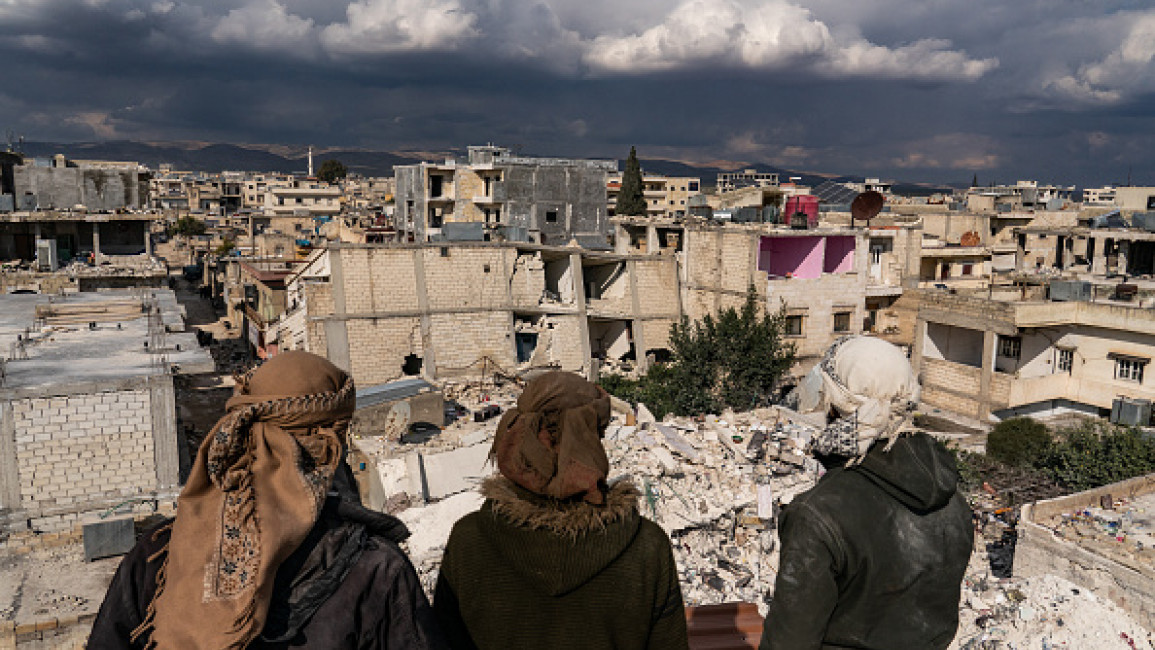Northwest Syria: IDPs lose homes again as host city Jindires devastated in quake
Bodies are still being recovered from under the rubble in the badly hit Syrian city of Jindires, near the Turkish border.
There was one moment of joy last Sunday, six days after the 7.8 magnitude earthquake that hit the region on 6 February, when six-year-old Moussa Hamidi was lifted out from under the rubble alive, after over 100 hours spent trapped in the devastation.
The boy's eyes were swollen due to head trauma, and his right hand was injured. He was quickly attended to by paramedics at the scene while members of the Syrian Civil Defence - the White Helmets - continued searching for his family. They found his brother later that evening, who couldn't be saved and died soon after.
In Jindires, as elsewhere across northwest Syria, the Syrian Civil Defence worked alongside local volunteers using their bare hands, and basic equipment, to force open gaps in the piled-up debris and cement in their desperate struggle to reach survivors.
Earlier this week, however, they announced that they were conducting final checks for survivors and would soon bring rescue operations to a close.
A Syrian Civil Defence member explained to The New Arab's Arabic-language sister site Al-Araby Al-Jadeed that the rescue teams focussed on certain parts of buildings where they had information showing that people were inside – or if they could hear cries from under the rubble.
But, he said, "from day three, those cries became much rarer because people who had been injured and lost blood would have lost consciousness by then, and would have gone silent, even if they were still alive."
Walid Muhammad, a Jindires resident, said: "The town, which is about 80km from Aleppo and 22km from Afrin, suffered severe damage in the earthquake. Around 300 buildings collapsed and 220 others were damaged."
The apartment building he lives in didn't collapse, he says, but huge cracks have appeared in the walls.
"Most of the victims are from the Damascus countryside, and were living in abandoned or unfinished buildings," said Walid, whose son-in-law and youngest daughter were still under the rubble at the time of writing.
He has another daughter, 30, who had been trapped under the staircase when the building collapsed, with her young son, who had been rescued.
Regarding the situation in Jindires, Walid said: "The people of the area have gone to stay with their relatives in nearby farms, while those who were already displaced need tents and food."
Jindires lies near Afrin in northwestern Aleppo province in the north of Syria. The recorded death toll was 756 in the latest count, and the injured and missing runs into the thousands.
Local authorities say there are many unidentified bodies, while many of the dead have been transported for burial in Idlib province. Scores of families are still under the wreckage.
One reason for the high number of casualties in Jindires is that the city is host to a large number of displaced Syrians, many of whom fled Eastern Ghouta near Damascus in 2018 after the regime attacked and captured the area.
Just like after the mass displacement of 2018, the earthquake has seen the return of thousands of homeless people to the streets. The city council announced that around 2,700 families are in need of shelter and assistance amid freezing weather and a lack of food, water, medicine, and other essential goods and services.
Abu Hamad, a survivor from Jindires, said: "The earthquake was a catastrophe that can't be described. We were sleeping, at 4 a.m. the shaking started, we got up… the building collapsed on top of us..people came and rescued us…and now, today, we have no shelter, no blankets… we have nothing."
Across the north of Aleppo province, ordinary Syrians, sometimes with the help of armed factions, are organising initiatives to help survivors by offering refuge and collecting money, blankets and clothes for them.
This was the case in Marea, a city in neighbouring Azaz district, to which hundreds of the newly homeless flocked.
Jindires council stated that 760 families had left for neighbouring areas of the Aleppo and Idlib countryside in the earthquake's aftermath, and that two camps have been set up to house 350 families.
The council added that around 2,500 tents were needed as well as food and water for shelters and the population in general, in addition to a field centre for emergency cases.
Jindires is a Kurdish-majority town within Afrin district known for its rich agricultural lands – it is famous for its olives and olive oil as well as producing grain, sugar beet, grapes, sesame, watermelon and tobacco.
The Kurdish-led People's Protection Units [YPG] controlled the town for years, however, in March 2018 Turkey and Syrian opposition factions it backs took control in a military operation dubbed 'Olive Branch'.
Following this, it became a destination for many Syrians displaced from the rural areas around Damascus, Hama and Idlib, as they fled military offensives carried out by the Syrian regime as it sought to seize control of these areas.
This is an edited translation from our Arabic edition with additional reporting. To read the original article click here.



